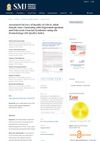4 citations,
May 2022 in “International journal of molecular sciences” Heat-killed Enterococcus faecalis EF-2001 may promote hair growth and transition hair follicles to the growth phase.
 March 2019 in “Journal of Investigative Dermatology”
March 2019 in “Journal of Investigative Dermatology” Seborrheic dermatitis is influenced by diet, genetics, and psychological factors.
 January 2006 in “Elsevier eBooks”
January 2006 in “Elsevier eBooks” Cats with Feline Symmetrical Alopecia can regrow hair with proper treatment based on the specific cause, including diet, medication, or stress management.
5 citations,
October 2021 in “Clinical, cosmetic and investigational dermatology” Japanese patients with alopecia areata often have a higher BMI and consume more vitamin C, fruit, and retinol, which may affect their condition's development or severity.
 1 citations,
April 2023 in “bioRxiv (Cold Spring Harbor Laboratory)”
1 citations,
April 2023 in “bioRxiv (Cold Spring Harbor Laboratory)” Climate-related nutritional stress may cause hair loss in juvenile male Guadalupe fur seals.
 37 citations,
January 2019 in “Dermatologic Therapy”
37 citations,
January 2019 in “Dermatologic Therapy” A dietary supplement with Boswellia serrata, Curcuma longa, and Vitis vinifera showed potential improvement in hair health for telogen effluvium patients, but more research is needed.
 29 citations,
March 2011 in “The Journal of Nutritional Biochemistry”
29 citations,
March 2011 in “The Journal of Nutritional Biochemistry” Eating isoflavone can help mice grow hair by increasing a growth factor.
 3 citations,
November 2020 in “Curēus”
3 citations,
November 2020 in “Curēus” A child's hair loss from alopecia areata was fully reversed in five months using diet and supplements.
 August 2023 in “Natural Resources for Human Health”
August 2023 in “Natural Resources for Human Health” Vegetarians should take B vitamin supplements to avoid health issues.
 98 citations,
October 2012 in “Dermatologic Clinics”
98 citations,
October 2012 in “Dermatologic Clinics” Eating the right nutrients can improve hair health, but taking extra supplements usually doesn't help unless you have a deficiency.
 October 2023 in “Siriraj Medical Journal”
October 2023 in “Siriraj Medical Journal” Acne and hair loss in women can greatly lower their quality of life, but having polycystic ovarian syndrome does not.
 1 citations,
February 2022 in “Biological Trace Element Research”
1 citations,
February 2022 in “Biological Trace Element Research” The combination of Arginine Silicate Inositol Complex and a new form of Biotin improved hair and nail growth in rats.
 239 citations,
July 2002 in “Clinical and Experimental Dermatology”
239 citations,
July 2002 in “Clinical and Experimental Dermatology” Low iron and L-lysine levels can cause hair loss in women, and increasing these nutrients can reduce hair shedding.
 207 citations,
April 2006 in “Journal of The American Academy of Dermatology”
207 citations,
April 2006 in “Journal of The American Academy of Dermatology” Iron deficiency may be related to hair loss, but there's not enough evidence to recommend iron screening or supplements for all hair loss patients.
 March 2012 in “Hair transplant forum international”
March 2012 in “Hair transplant forum international” Environmental factors and chemicals might affect hormone balance and contribute to common hair loss.
 11 citations,
September 2007 in “Advances in therapy”
11 citations,
September 2007 in “Advances in therapy” INVERSION Femme supplement helped women lose weight, reduce hair loss, and improve skin and nail health.
 June 2007 in “Endocrinology and Metabolism Clinics of North America”
June 2007 in “Endocrinology and Metabolism Clinics of North America” The document covers various male health issues, their causes, treatments, and related conditions.
 2 citations,
July 1998 in “Dermatologic Clinics”
2 citations,
July 1998 in “Dermatologic Clinics” European dermatologic treatments focus on lifestyle and psychosocial factors, use diverse methods like baths and climate therapy, and emphasize the importance of diet and supplements for skin health.
 64 citations,
September 2006 in “International journal of epidemiology”
64 citations,
September 2006 in “International journal of epidemiology” Cancer development is like natural selection, involving mutated cells and environmental factors.
 9 citations,
February 2014 in “Tissue Engineering and Regenerative Medicine”
9 citations,
February 2014 in “Tissue Engineering and Regenerative Medicine” Conditioned media from human amniotic fluid-derived stem cells helps skin heal and protects against aging from sun exposure.
 1 citations,
November 1976 in “Archives of Dermatology”
1 citations,
November 1976 in “Archives of Dermatology” Dermatopathology has made significant progress but many skin diseases remain incurable, requiring ongoing research.
 29 citations,
September 2012 in “Dermatologic Clinics”
29 citations,
September 2012 in “Dermatologic Clinics” Hair disorders are caused by a complex mix of biology, genetics, hormones, and environmental factors, affecting hair growth and leading to conditions like alopecia.
 18 citations,
January 2020 in “Ecology and evolution”
18 citations,
January 2020 in “Ecology and evolution” Genes related to pigmentation, body rhythms, and behavior change during hares' seasonal coat color transition, with a common genetic mechanism in two hare species.
 30 citations,
July 2010 in “Experimental Dermatology”
30 citations,
July 2010 in “Experimental Dermatology” Polyamines are important for hair growth, but more research is needed to understand their functions and treatment potential.
 47 citations,
October 2014 in “Expert Opinion on Emerging Drugs”
47 citations,
October 2014 in “Expert Opinion on Emerging Drugs” New alopecia treatments aim for better results and fewer side effects.
 18 citations,
October 2014 in “Experimental Biology and Medicine”
18 citations,
October 2014 in “Experimental Biology and Medicine” Eating vitamin A affects hair growth and health by changing cell signals in mice.

Accurate diagnosis and tailored treatments are crucial for managing hair loss in humans and animals.
 November 2022 in “Journal of Education, Health and Sport”
November 2022 in “Journal of Education, Health and Sport” The skin's bacteria might influence the development of a hair loss condition called alopecia areata.
 26 citations,
January 2017 in “Journal of Clinical Pediatric Dentistry”
26 citations,
January 2017 in “Journal of Clinical Pediatric Dentistry” Dental erosion is common in adolescents and is linked to diet and higher socioeconomic status.
1 citations,
December 2023 in “Life” PRP helps skin heal, possibly through special cells called telocytes.


























